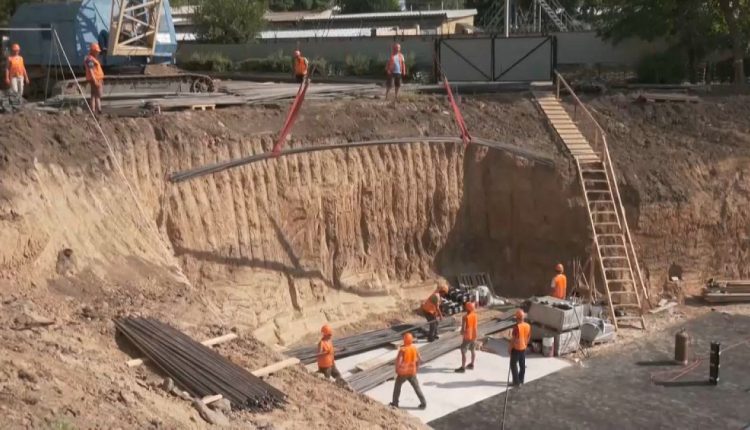Ukraine’s Deputy Minister of Education says every seventh school in the country is currently damaged as a result of the full-scale invasion. Over 3,500 educational institutions have suffered some kind of destruction and nearly 400 have been completely destroyed.
The first underground school is being built in the southern Ukrainian city Zaporizhzhia, where it’s expected that children will be able to attend in-person classes in autumn.
The school, which is designed to accommodate 500 students, is being built almost seven metres underground.
The new underground school is being built to accommodate students from two nearby schools so lessons will take place in two shifts.
At the nearby overground School Number 88, a third radiation shelter is under construction which will also double as a classroom for offline learning.
“Our school is the only one in this neighbourhood, there is no other alternative for children to go to. Parents have responded very well but some are still thinking whether it is necessary or not,” said principal Liudmyla Zlatova.
While some parents are wary about sending their children to school in a country at war, others say it’s important to maintain a sense of normalcy.
“We were very happy and the kids were happy, they miss live communication. Nowadays, the children’s eyesight is deteriorating because they are constantly sitting at the computer and their eyes do not rest,” said Liubov Pashina, the mother of one of the pupils at School Number 88.
The Zaporizhzhia oblast governor Ivan Fedorov said last month that ten underground schools will be built across the region, with five already under construction and expected to open by the end of the year.
“We are on track to start the educational process in new underground schools in the fall,” he said.
It’s more than two years since Russia invaded Ukraine and, in that time, civilian infrastructure, including schools, has been repeatedly targeted.
And of all the conflict zones in Ukraine, Zaporizhzhia has particular significance. It’s home to Europe’s largest nuclear power plant which Russian forces seized shortly after the invasion.
They’ve occupied it ever since and while it’s been offline since 2022, fighting around the plant has raised alarm across Europe with many fearing a major nuclear disaster.
The UN’s International Atomic Energy Agency has repeatedly warned against fighting in and around the plant with the agency’s chief Rafael Grossi calling drone strikes there in April “reckless”.
Last month, Human Rights Watch said in its ‘Education Under Occupation’ report that the Russian invasion had ‘put Ukraine’s education system under enormous strain’.
The report said Ukrainian national and local education authorities, with support from Ukrainian civil society and international donors, had taken ‘innovative steps to provide education’.
These include efforts to expand the online curriculum which had been in place since the coronavirus pandemic. The report said this now includes ‘10,000 video lessons covering the curriculum from grades five through eleven’.
Every seventh school in Ukraine is currently damaged as a result of the full-scale invasion. Over 3,500 educational institutions have suffered some kind of destruction, and nearly 400 have been completely destroyed,” Yevhen Kudriavets, Ukraine’s Deputy Minister of Education, said in February.
He said that attacks on educational infrastructure violate children’s right to an education and has an impact on educational quality, socialisation and societal integration.
A World Bank report released in February put the cost of Ukraine’s recovery and rebuilding at $411 billion (€378 billion) over the next decade.
Read the full article here

